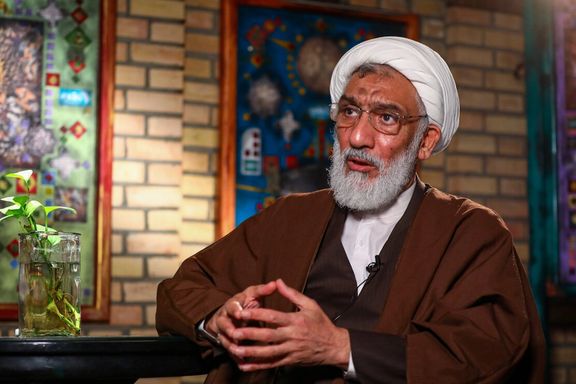Iranian Presidential Candidate Downplays Role in 1988 Mass Executions

Iranian presidential candidate and cleric Mostafa Pourmohammadi has downplayed his role in the mass executions of dissidents carried out by the Islamic Republic during the 1980s.

Iranian presidential candidate and cleric Mostafa Pourmohammadi has downplayed his role in the mass executions of dissidents carried out by the Islamic Republic during the 1980s.
"The narrative of the 1980s is quite different. The people were our supporters, sharing our views. In fact, their demands were more severe, and they called for harsher sentences," Pourmohammadi said in an interview published on YouTube last week.
After a fatwa by Supreme Leader Ruhollah Khomeini, authorities carried out the extrajudicial executions of thousands of political prisoners across Iranian jails in 1988. Amnesty International estimates that between late July and September of that year, a minimum of 5,000 people were killed, with their bodies dumped in unnamed individual and mass graves. Iranian exiles claim the total number of deaths could be over 20,000.
Pourmohammadi referred to the execution of political prisoners in the summer of 1988 as "a project of the Islamic Republic.
“These were challenging times for the system, marked by intense conflict. We had to make critical decisions,” he added.
Pourmohammadi has held several key roles within the state but is widely known to the public for his role on the “Death Committee.”
These were three-person committees established by the state to oversee the purge of political prisoners in each Iranian jail. Each comprised a prosecutor, a judge, and a representative of the Ministry of Information. Pourmohammadi represented the Ministry of Information on the committee at Tehran’s notorious Evin Prison.
Along with other recognizable figures, including former President Ebrahim Raisi, he would sentence political prisoners for summary executions in 1988.
In response to the association of his name with executions on social media, Pourmohammadi stated, "What can I do? I served as a judge for a period. My duties involved either conducting trials or drafting indictments. Some individuals were fined, some were imprisoned, and some were executed. It is akin to a doctor whose name becomes synonymous with performing surgeries."
Regarding his role in these executions, Pourmohammadi attempted to justify the actions by emphasizing that “only” individuals affiliated with the opposition group Mojahedin-e-Khalq Organization (MKO) who were actively "engaging in hostilities against the people" were sentenced to death by the oversight committees.
Pourmohammadi did not refer to the many individuals, part of left-leaning opposition parties, who were also among those executed.
According to Amnesty International, throughout Iran, “predominantly young men and women, including teenagers, who were unjustly imprisoned for their political views and non-violent activities” were gathered from their cells and presented before "death commissions" composed of judicial, prosecutorial, and intelligence authorities.
They underwent brief and arbitrary interrogations where their answers could determine their fate. In some instances, prisoners were offered the chance to renounce their political beliefs and affiliations in exchange for a pardon or commutation of their death sentences. Many prisoners, however, refused to recant their beliefs, resulting in their execution.
Pourmohammadi appeared to suggest that during the interrogations of political prisoners, he implored them to answer the committee’s questions in a way that would spare them from the death sentence.
The current presidential candidate has previously held other key positions in the Islamic Republic, including deputy intelligence minister, head of the social-political bureau in the Supreme Leader's Office, and leader of the General Inspectorate Organization. He also served as interior minister under President Mahmoud Ahmadinejad and as justice minister under President Hassan Rouhani.
Last week, Javaid Rehman, the UN Special Rapporteur on Iran commented on the mass executions in the 1980s, saying, “The whole exercise of the Death Commissions was not to use law.”
“It was simply to execute people based on what those commissioners felt, whether they were going to repent or whether they were going to be steadfast in their political ideological positions. And that is what happened, that the commission sent thousands of people to their execution,” Rehman said.
“What happened was that, obviously, it was not a court of law, so they did not have any rights. They could not question the judgments of these commissions. They were executed at a very short notice. Many of them could not defend their case. They were asked questions that were not legal,” he added.
During the final days of the 1980-1988 Iran-Iraq War, executions were conducted following Khomeini's declaration that apostates and those who had taken up arms against the Islamic Republic were guilty of "waging war against God" and thus deserving of death sentences.
In 2016, an audio recording from 1988 surfaced featuring Hossein Ali Montazeri, once poised to become Iran's supreme leader, condemning the authorities for implementing a fatwa issued by Khomeini.
"I believe the greatest crime in the history of the Islamic Republic, for which history will condemn us, has been committed by you," Montazeri told a group of judiciary officials involved in the executions, including Pourmohammadi.
"Your names will go down in history as criminals," Montazeri said.
Conversely, in his latest interview, Pourmohammadi claimed that Montazeri considered him a “devout and competent” individual.
The crimes committed in the 1980s, described by Rehman as crimes against humanity, have not led to the prosecution of those involved in Iran.
In a landmark case in 2022, a Swedish court found Hamid Nouri, a former Iranian official, guilty of war crimes for his involvement in the mass executions of political prisoners. This marked the first prosecution of an Iranian official implicated in these mass murders, which Tehran has never formally acknowledged.
Earlier this month, Nouri, who had been sentenced to life in prison, returned to Iran as part of a prisoner swap between Sweden and Iran. The exchange secured the release of two Swedish citizens who were imprisoned in Iran.